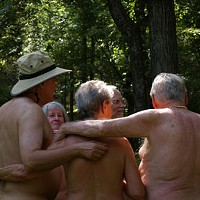What is a Hate Crime?
From NYC to Duke, race issues hover like stale cigarette smoke
Three weeks ago, New York University student Broderick Hehman was murdered by a racist mob on New York's 125th Street after he made the mistake of stopping to give a dollar to a wheelchair-bound homeless man.
His teenaged attackers demanded to know why he didn't give them a dollar, yelled racial epitaphs at him, shoved him and held him in a "bear hug" while the group punched him in the face. According to witnesses, one of the attackers was still punching Hehman as the group chased him into the street, where he was hit by a car. The kids didn't bother to call an ambulance, and instead stood on a corner laughing as Hehman lay bleeding in the street. He died six days later.
You're probably wondering why you haven't heard about this. That would be because Hehman was white and his attackers were black and Latino. That Hehman's attackers weren't charged with a hate crime outraged the only people who bothered to stand up for Hehman -- a group of African-American police officers called 100 Blacks in Law Enforcement who claim the New York Police Department deliberately doesn't charge defendants with hate crimes to keep hate-crime statistics low. The group denounced the NYPD and offered a $1,000 reward for Hehman's killers, a classy move that apparently didn't fit the media's "nation-torn-by-racial-hatred" template.
Now imagine what would have happened if instead of throwing that wild party last month in Durham, the Duke lacrosse team had had an away match in Manhattan, gotten off the subway, yelled racial slurs at a black college student and chased him to his death.
The equivalent occurred in 1986, when white Howard Beach teens yelled racial epitaphs at and beat three black men, one of whom was killed when he ran into the path of an oncoming car. That crime also happened in New York, and in the 10 days that followed, the New York Times, which likened the attack to a lynching, published 39 articles about it, according to a search of Lexis-Nexis. The rest of the nation's newspapers were equally outraged. They just couldn't get enough of the Howard Beach injustice.
So far, the Times has done 24 articles on the alleged gang rape of a stripper by members of the Duke lacrosse team. The paper did just two short articles on Hehman's murder, buried inside the paper, and a few news briefs, also buried inside the paper. Two of those stories portrayed the incident as a traffic accident. In contrast, the paper plastered the Duke incident across its front page and the front page of its sports section.
To its credit, the Associated Press wrote multiple wire stories about the Hehman murder, but the nation's newspapers weren't interested in running them. A Lexis-Nexis search showed that a couple of New York papers ran AP news briefs on the incident, and the Los Angeles Times gave it 63 words.
The media was just too busy rubbing our faces in the alleged lacrosse team rape and the "elitist" atmosphere that supposedly spawned it to report on the Hehman case. The word "elite" has been used in about two-thirds of the more than 1,000 news articles on this topic so far, both to describe Duke and the lacrosse team. That the average Duke student graduates at least $20,000 in debt and that 40 percent of Duke students qualify for financial aid didn't fit the elitist template, so these facts were ignored, too.
One of the most troublesome tactics reporters used to foment racial animosity was to interview those who claimed that the Duke incident would have been handled differently if the victim weren't black, then to regurgitate those claims unchallenged in print as though they were fact.
Here's an example from a Charlotte Observer article on March 31: "Students expressed frustration about how race and class affect how the incident is being handled by investigators and Duke, and in the media. Duke is a predominately white, private and elite school. N.C. Central, a historically black school, is public."
Like the Observer article, about half the stories I read didn't specify exactly what was unjust about how the incident was handled, leaving the vague racial allegation to hang in the air like stale cigarette smoke. Other articles included vague suggestions by interviewees that the Duke students would have been arrested by now if they weren't white and "privileged," claims that no reporter bothered to check out in any of the articles I read. And I read dozens.
Had members of the media lifted a finger to verify these claims, they'd have learned that it typically takes North Carolina's desperately underfunded state crime lab at least six months to process DNA samples in criminal cases and nine months to a year for the judicial wheels to begin turning in one. The situation is so desperate that two weeks ago many of the state's mayors went to the state capitol to beg for more criminal justice system money. That the two-week turnaround on the DNA testing in the Duke case was somehow unjust is laughable. If anything, it was unjust to other rape victims who must wait months for the identity of their attackers to be verified.
How Duke administrators were supposed to take action against the alleged perpetrators of this crime when none had been named by investigators until last week was another baffler. But these questions don't fit the "nation-torn-by-racial-hatred" template, so as far as I can tell, no one bothered to ask them.
This, I believe, is a big part of why we still have the race relations problems we do in America.
Speaking of 3.91000
-

Food In The Nude
Sep 6, 2006 -

I Changed my Sex. Now What?
Apr 19, 2006 - More »
Latest in Citizen Servatius
Calendar
-

The Comic Strip (Comedy + Sip & Paint) @ Cloudcheck CLT
-

Queen Charlotte Fair @ Route 29 Pavilion
-

NEW WINDOW GALLERY-Pat Rhea-ACRYLIC PAINTINGS-April 05-30 2024 VALDESE, NC 28690 @ New Window Gallery/Play It Again Records
- Through April 30, 12 p.m.
-

TheDiscountCodes
-

Wine & Paint @ Blackfinn Ameripub- Ballantyne






